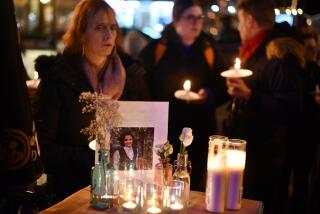Gay couples left out by the law — again
Our family exists at the crossroads of two of the most controversial aspects of American society — sexuality and race. We’re two gay white men raising two black children — a girl, 13, and a boy, 10.
Both children were adopted out of the foster care system as toddlers, and they both landed in that system because their birth mothers could not care for them. Each day we struggle with the legacies of their troubled beginnings, which gives us all the more joy as we see them thrive.
Dan and I are a long-lived couple. As we approach our 29-year anniversary, we joke that our relationship has outlasted those of just about every straight couple we know. And yet, again and again, the law has failed us.
DECISION: U.S. Supreme Court overturns DOMA
Even now, though we applauded the Supreme Court’s decision to invalidate portions of the Defense of Marriage Act, the law continues to let us down. Let me explain.
The legal system in most of America has never provided much protection to families like ours. And in some places it’s actively hostile. In 2004, the voters of Ohio, where we lived, passed an amendment to the state constitution that not only outlawed gay marriage, it also barred the state from creating or recognizing “a legal status for relationships of unmarried individuals that intends to approximate the design, qualities, significance or effect of marriage.”
In other words, Ohio’s Constitution was rewritten to exclude our family from the most basic protections. The two of us couldn’t even be legally recognized as the parents of our children. Adoption papers would allow only one of us as a parent. The other was officially “Household Member #1.” As a magistrate told us, there was just no place for both of us in the eyes of the law.
FULL COVERAGE: Prop. 8 and DOMA
We knew we had to leave. We decided that we’d both look for work in states that at least recognized families like ours. When I was offered a job in Oregon, we packed the kids and dog into the Subaru and headed west. In Oregon, we could at least co-adopt the children and even get the consolation prize of a domestic partnership.
It wasn’t something we wanted to do, but we felt we had no choice. We left a lot behind in Ohio. We loved our home and community there. The kids went to schools they liked, and we loved our jobs and colleagues. We had an intimate and racially diverse group of family-like friends, including strong female role models for our children. We had painstakingly built a network of healthcare and educational professionals whose expertise and advocacy were crucial for meeting the special needs of our children.
And those were only the human costs. There was also the financial hit that came with selling and buying a home, moving, redoing adoptions and wills, losing benefits and pensions, restarting the vesting period and forfeiting Dan’s career.
When people cast their ballots, I wonder if they think about the real lives affected by all this political maneuvering.
Even the DOMA decision left many families — like ours — out in the cold. We live in a state that doesn’t allow same-sex marriages. The domestic partnership that seemed so appealing when we moved across the country doesn’t afford us any of the federal protections now available to same-sex couples in the 13 states (plus the District of Columbia) that allow same-sex marriage.
For those of us trapped elsewhere in the country — even in places we love — the verdict reinforces the fact that the security of our families and our futures rises or falls depending on where we live. The Supreme Court’s simultaneous decision on California’s Proposition 8 also reflects the precarious legal space in which families like ours must exist as our welfare is tangled up in state-level decisions and politics. And even though a majority of the court ruled that DOMA was unconstitutional, only five of the Supreme Court’s justices agreed with the decision. The lives of so many Americans hung on a single vote.
It was both liberating and frightening to wake up on the morning after the DOMA decision and realize that the very terms of life had changed overnight for many same-sex couples.
But until the president and our lawmakers can figure out how to protect all families — not just those lucky enough to live in enlightened states — it looks as if my family will be forced to chase the law. Again.
Rick Settersten is a professor of social and behavioral health sciences at Oregon State University.
More to Read
A cure for the common opinion
Get thought-provoking perspectives with our weekly newsletter.
You may occasionally receive promotional content from the Los Angeles Times.






